|
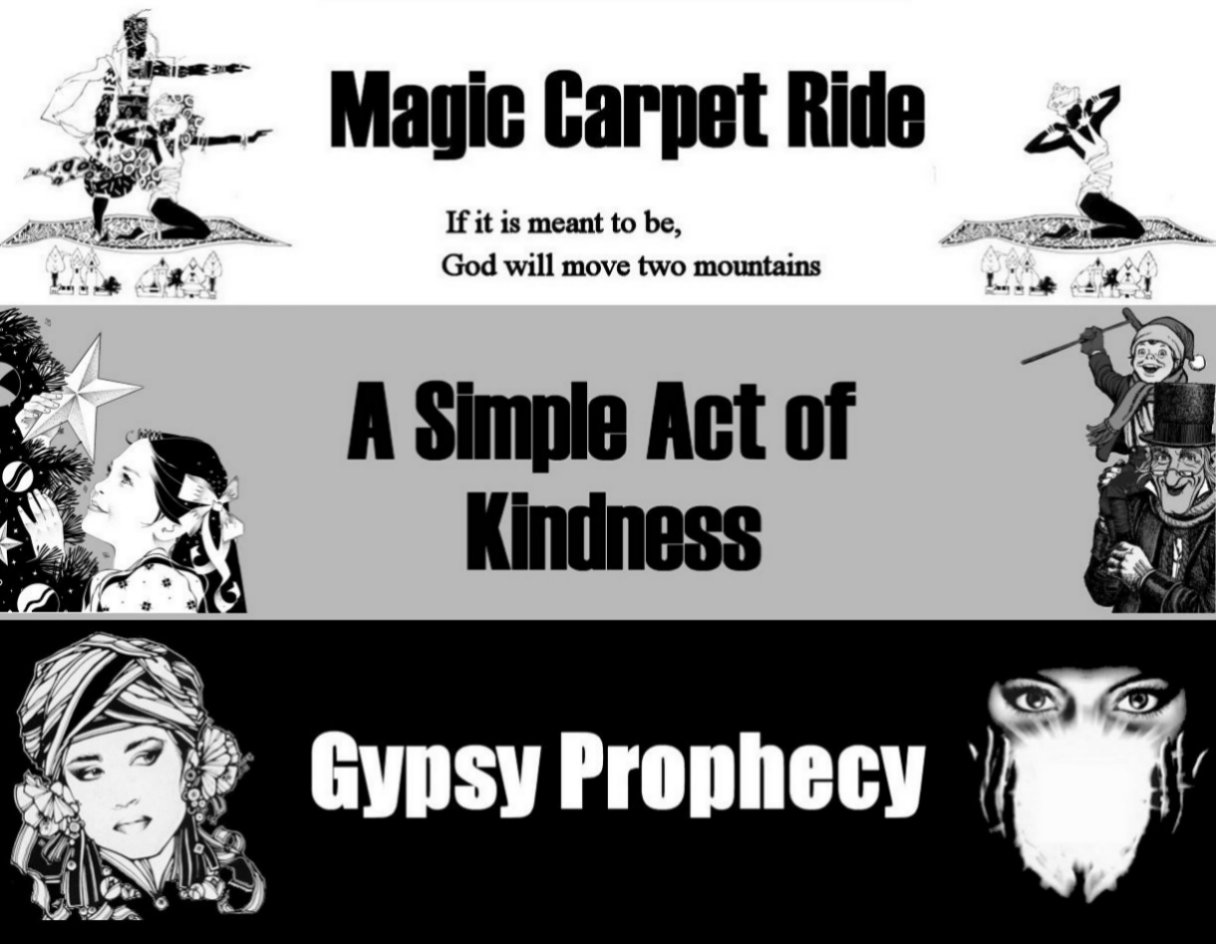 |
A SIMPLE ACT OF
KINDNESS
CHAPTER one:
introduction
Written by Rick
Archer
|
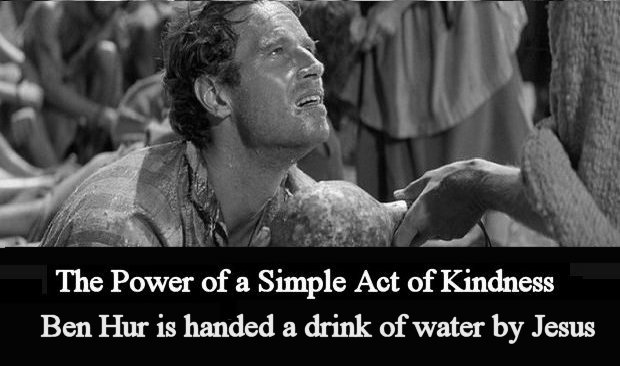 |
Rick Archer's Note:
On the
surface, A Simple Act of Kindness is a
memoir of my difficult childhood. However,
that is not the main purpose of this book.
I intend to explain how the events of my life convinced me of the existence of Fate.
I also wish to
emphasize the Christian
message of Kindness as implied by the title of my book.
So what qualifies me to write a
book on Fate?
Over the
course of my lifetime
I have had
many
remarkable experiences that make it difficult to
believe in anything else.
Starting
at age 20, I made a decision to begin a List to
include every weird event that had occurred to date,
then continued to add to my List as time passed. Over
the years I have kept careful track of each strange
experience.
|
 |
I fully
admit that not everything on my List of Suspected
Supernatural Events can be considered hard evidence.
I have listed half of my events as 'Suspicious'.
The other half I listed as 'Serious'.
Five Events are so unbelievable I called them 'Ultra-Serious'.
A Simple Act of Kindness is based on
four of these 'Ultra-Serious' Coincidences.
My List
crossed the 100 threshold at age 50. But why
stop there? Recently I experienced #115 at age
73. So what is the story behind my List of
Supernatural Events?
In his
book Memories, Dreams, and Reflections,
the Swiss psychotherapist Carl Jung suggested a
careful study of Coincidences would reveal an
order to the Universe that defies understanding
based on our current laws of physics.
Carl
Jung was a noted scholar who gave public credibility
to mystic ideas. His mother was said to have
spoken with the dead. Her embrace of the
supernatural influenced Jung and formed the basis of
his controversial ideas. Jung suggested
paranormal events such as premonitions, ESP,
ghosts, precognitive dreams, and coincidences might
turn out to be natural events for which science has
not yet advanced far enough to comprehend.
Dr. Jung
asked how is it possible for psychics to
predict the future based on our prevailing view of
Reality.
Considering my List contained four incidents that
strongly suggested Precognition was involved, I
decided to pay close attention to what he had
to say. In particular, I noticed his emphasis
on Coincidence.
"The problem of Synchronicity has puzzled me for
a long time, ever since my middle twenties when
I was investigating the phenomena of the
collective unconscious. I kept on coming
across connections which I simply could not
explain as chance groupings. What I found
were 'Coincidences' which were connected so
meaningfully that their chance concurrence would
represent a degree of improbability that would
have to be expressed by an astronomical figure."
Speaking
of Probability, let's have some fun with this.
Let's say 90% of my observations are pure hogwash.
However what about the remaining 10%? At least
11 events on my List are astounding and very
difficult to explain using our conventional view of
Reality.
Personally I pegged the
probability of chance occurrence for each of the
remaining 11 at one in a million. However, to
keep things simple, let's assign a probability of
'one in 10' to each.
What are
odds of one in 10 multiplied 11 times?
Somewhere around one in a Billion or one in a
Trillion.
This is
what Carl Jung meant when he said, "What
I found were 'Coincidences' which were connected so
meaningfully that their chance concurrence would
represent a degree of improbability that would have
to be expressed by an astronomical figure."
I do not
wish to tell you what to think. I prefer to
share my stories, tell you what I think, then let you draw your own
conclusions as we go along. I am the witness,
you are the judge and jury.
|
 |
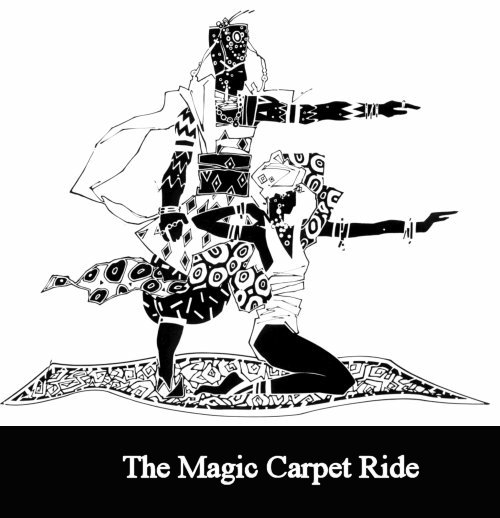 |
I have
written three books on the subject of Fate.
A Simple Act of Kindness
revolves around the Miracle which saved my life and
led to my belief in God. This book covers the immense problems I
faced throughout childhood, high school, college,
and graduate school. In particular, I explained
how the kindness of several key individuals enabled
me to overcome the serious emotional
handicaps caused by my tough childhood. This
book also explains how I first became interested in Fate.
Magic Carpet Ride picks up where the first
book leaves off. It covers a ten year span,
1974-1984, which reveals how a series of uncanny lucky
breaks created SSQQ, the dance studio which became my life
work.
Gypsy Prophecy began as a way to tell the
story of an unusual event in
2001. Something very strange happened which strongly suggested the marriage to my wife Marla
was predestined far in advance.
|
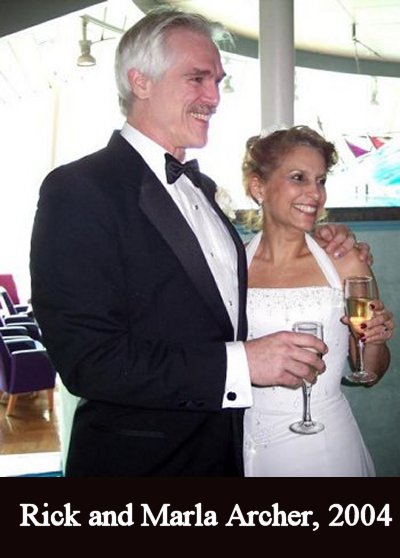 |
I
have Marla to thank for my decision to write
A Simple Act of Kindness. I had
just started writing Magic Carpet Ride
which covers the unusual events of my long
career as owner of a popular dance studio in
Houston, Texas.
One
day in 2013 Marla and I were taking a walk in a forest preserve
near our hosue. As we walked along, I
commented I had just begun to write my book.
Marla asked, "What will you call it?"
"Magic
Carpet Ride, the story of my dance
career."
"I like your title. Where does it
begin?"
"Age
24 following my dismissal from graduate school."
"Why not start with your childhood?"
"It
would make my book too long to start there."
"But, Rick, you have to tell them
about your childhood. Otherwise no one will
ever understand just how screwed up you were when
you started your dance career."
Hmm.
Thanks a lot. That's Marla for you.
Unfortunately, as usual, Marla was right.
And so I decided to write A Simple Act of
Kindness in addition to Magic
Carpet Ride.
|
Before
we start, a brief biography would help.
In 1977 a job
as a part-time dance instructor fell into my lap.
For two months I taught line dances to ten students
one night a week. Not exactly an auspicious
start. That changed dramatically when Saturday
Night Fever came along. Suddenly I was
teaching every night of the week. I was so
overwhelmed by the surge of interest that I found
myself woefully unequal to the task.
Fortunately, thanks to a highly suspicious series of
lucky breaks, I was able to extricate myself from
one jam after another.
Despite the uneasy
feeling that my continued success was well beyond my
talent level, I created a dance studio named
SSQQ (Slow Slow Quick Quick).
SSQQ was a pretty wonderful place if I may say so.
In fact, I have good reason to believe SSQQ was the largest
independent studio in the country at the turn of the
Millennium.
Although
I received many compliments over the years, in the
privacy of my own mind I was reluctant to take too much credit
for the studio's success. Sure, I had
some good ideas, but who can say where 'Inspiration'
really comes from? In my case, all I had to do
was follow a trail of bread crumbs. Each
time a door opened, I walked through it and
watch the studio would reach a higher stage of
development. These lucky breaks drew a
preordained path called 'Destiny'. Or at least
that's the way it looked to me.
Convinced these doors were opened by a Divine
Architect,
I concluded I was leading a
charmed life.
However, I did not dare tell
people my secret. It had nothing to do with
false pride, but rather a fear of being laughed at.
Who wants to be written off as crazy? However,
my retirement in 2010 conveniently removed any
further need to be respectable. Freed of that
constraint, I decided it was time to share my secret story.
|
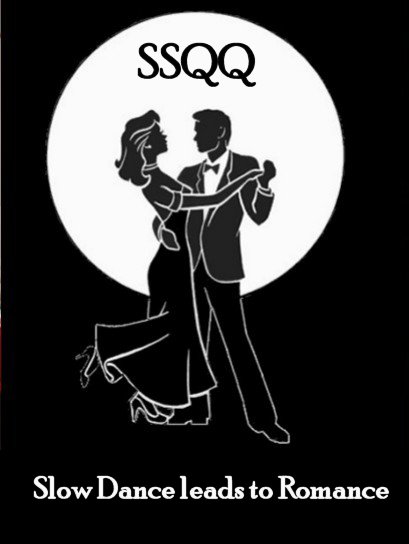 |
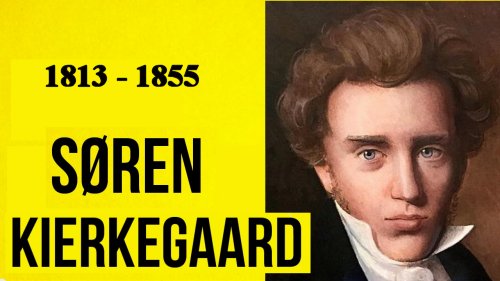 |
Life can only be understood backwards; but it
must be lived forwards.
-- Soren Kierkegaard
What
makes A Simple Act of Kindness
unusual is my tendency to analyze the most
important stories from two perspectives... my
understanding of the event as it took place as
well as how I came to view the event
further down the road. I feel
fortunate to be in
my 70s as I write my books. 'Hindsight' has made it so much easier to
explain things.
The
Impact of a strange
event is rarely obvious at the exact moment it
occurs. For that reason, whenever a story involves a potential example of Fate in
action, I will first tell the story, then allow my
older self to comment on future developments via the gift of Hindsight.
|
Without
Hindsight, this book would not make a bit of sense.
Let me offer an example. When I wrote the
first draft of Magic Carpet Ride,
I did not dare share my secret belief that I had
led a charmed life. I certainly did not
consider myself even remotely qualified to
assume I had the right to speak about God. The danger of writing a book in
which Fate and the existence of God are the central
theme runs the risk of being written off as musings of a delusional
crackpot. Or simply laughed at. And so,
for fear of ridicule, I omitted any mention of
God and Fate in my early draft. Then one
day something peculiar happened. I asked a friend
of mine, Jim Dulaney, to read a chapter as a favor. His response was not what I
expected.
"You've got to be
kidding, Rick. For starters, what is
the purpose of your book? Best I can
tell, it is an autobiography, but that genre
is usually restricted to famous people.
So I assume you are famous, right? And
why do you make such heavy use of
coincidence? Who do you think you are,
Charles Dickens? I have a suggestion.
No one is going to believe this stuff really
happened! Stop exaggerating and stick
to the truth. Personally, I think you
are better off passing this off as Science
Fiction."
Jim implied my story was
too far-fetched for his comfort. Stung by
his criticism, three things crossed my mind.
I agreed my story was weird, but I had
told the truth. Second, I was not
exaggerating. However, I saw Jim's point.
Readers get very uneasy with writers who rely too
much on weird Coincidences to advance their plot. It
was my third thought that really got my attention.
Did Jim's stern message contain a hidden
meaning? Perhaps Jim's
rebuke was God's way of suggesting I confess my belief in Mysticism. That was the moment I decided to come clean.
It was time to publicly admit why I believed I had long been the
beneficiary of God's blessings.
|
And so I decided to rewrite my
books in a much different way. From now on,
after each unusual story, I would comment on its
Impact using the advantage of my advanced years.
In other words, I would explain my life as I lived
it forward, then turn around and explain the
same story backwards.
I have
learned that a small, very odd Coincidence can lead
to profound consequences. However, most people
do not take Coincidence seriously. For one
thing, coincidences are rare. For another
thing, they are random and often take place when we
are too preoccupied to pay attention. In
particular, since most Coincidences are frivolous, we
learn to ignore them. And, most important of
all, until we know their Impact, we have
little reason to take them seriously. By that
time, the Coincidence is often long-forgotten.
While I
agree that most Coincidences are frivolous, there
are meaningful Coincidences which serve as clues
to the existence of God. Nor do I
not think I am alone. Many
people have reached the same conclusion as me that
certain Coincidences suggest there is
more to this world than meets the eye.
I
understand there is
no way to prove the existence of Fate 'scientifically'.
That said, the unusual events of
my life offer strong empirical evidence to suggest Fate plays a vital role in our lives.
For the past two thousand years, the Holy Bible has
been the all-time best-seller because people trust the
word of the men who wrote
about those miracles. I too
intend to write about Miracles. Since many of
my stories will arouse your skepticism, I give you my
word I have described the details of each Supernatural
Event as accurately as possible.
Although
my events are modest compared to the parting of the
Red Sea, nevertheless they far exceed the accepted rules of probability.
You may question whether my observations were
accurate. That is your right. You
may not agree with my conclusions. That is okay. However, I dare you to dispute the fact
that many of these stories are downright weird.
If you like weird stories, you will love this book.
Once you read about my experiences, I suspect you
too will begin to question the nature of what we
refer to as 'Reality'.
And with
that, lets read the story of my first Supernatural Event,
a brush with death.
|
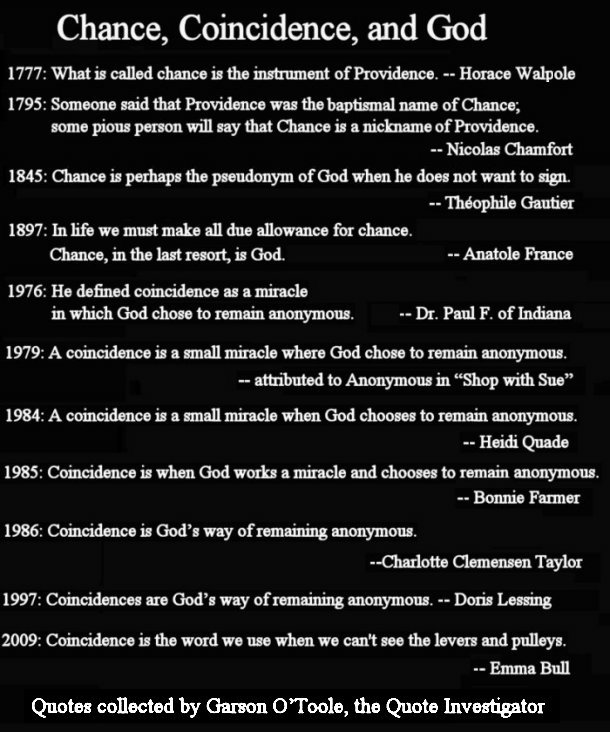 |
|
|

A SIMPLE ACT OF
KINDNESS
CHAPTER TWO:
A BRUSH WITH DEATH
Written by Rick
Archer
|
|
|

|
Rick Archer's Note:
The danger of writing a
book in which Fate and the existence of God are the
central theme is being written off as a
crackpot. Oh well,
that's a risk I guess I will have to take.
Once upon a time heretics such as
Giordano Bruno were burned at the stake. And
what was his crime? Bruno was ordered by the
Catholic Church to recant his belief that Copernicus
was right about the Sun acting as the center of our
Universe, but he refused.
Fortunately in modern times the punishment for
outlandish claims is
ridicule. I suppose there are worse things to fear.
|
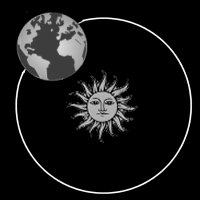 |
My
friend Jim Delany said I needed to be famous to write an
autobiography. Hmm. No such luck.
However, to the people who do know me,
I am
considered relatively harmless. I am happily
married, have a daughter in graduate school, own my
house, pay my bills promptly, and have no criminal record.
During
my career as a dance instructor
I helped build a thriving dance community kept
intact by a countless number of close friendships.
SSQQ is gone now, but in its day the
studio was very special. When I retired from my dance studio in 2010, I left
behind a 32 year legacy of running a popular,
scandal-free business that taught roughly 400,000
students how to dance. The statistic I am most
proud of are the 400 marriages that took place
involving people who met at the
studio.
My
successful career is all the more remarkable based
on my difficult childhood. I predict my
Readers will be appalled by the heart-wrenching
stories contained in this book. I might add
that I don't look very good much of the time.
I was an only child raised by dysfunctional parents.
My father abandoned me and my mother ignored me to
look for love. Forced to raise myself starting
at age 10, I did not do a very good job. This
explains why I grew up gnarled and twisted. However,
let's not get ahead of ourselves. The good
news is that I turned out okay.
And how did that
happen? A Simple Act of Kindness.
|
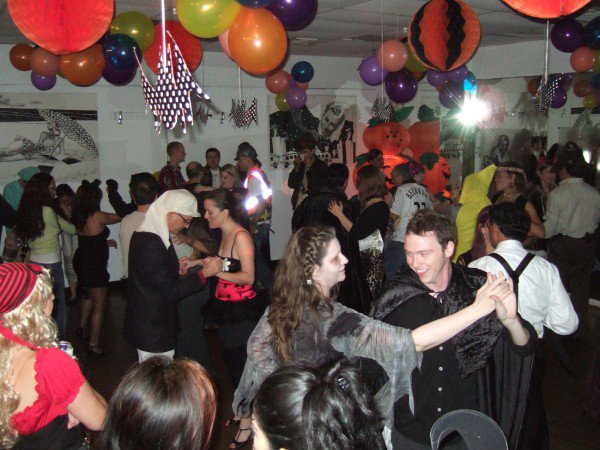 |
|
early 1955
THE DAY I CUT MY eye OUT
|
Born at the end
of 1949, that makes it easy to keep track of my age. For example, I was 5
in 1955. Like a lot of kids that age, I was young and
stupid.
For reasons that escape me now, one
morning it was terribly important to take a thick piece of
rope and cut it in two. My mother was in another room
watching TV as I searched for a tool. Sharp knives
were kept in places I could not reach, so the only thing I
could find was a dull kitchen knife. The weak serrated edge
was not getting the job done. It was taking forever to cut through this
rope, so without thinking I changed directions and began pulling the knife towards me. I was
stronger pulling in the wrong direction, so I continued. It was slow going,
at least ten
minutes, possibly longer.
I was nearly
finished when suddenly my mother called from another room in
a loud, demanding voice. "Richard, it's time to go."
I
immediately protested. "But, Mom, I'm not done yet!"
Mom responded, "I don't care.
Andale! (Spanish for
hurry). Whatever you're doing, finish it up and
let's Vamanos."
|
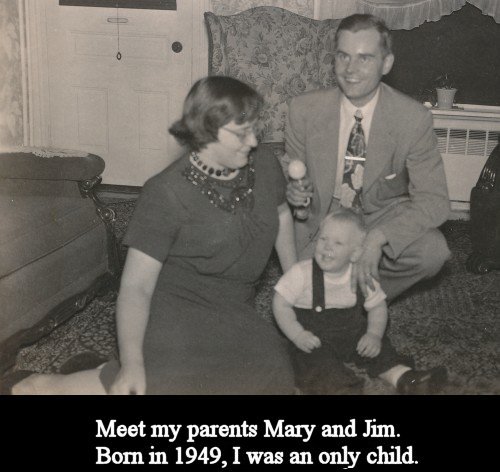
|
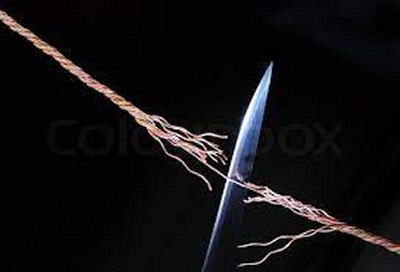 |
A
sense of urgency came over me. I was almost
done, so I gave the knife one big jerk. The knife went
through the rope like butter and, since I am
left-handed, continued in an arc that sliced
the pupil of my left eye. Strangely
enough, it did not hurt at all. All I
remember is some fluid gushing out and then
the eye went blank. Of course I
screamed.
Next thing I
know, Mom was rushing me to the hospital. Tough luck.
Ultimately the eye could not be saved. I developed a
cataract but two surgeries to correct it
were
unsuccessful. Even more problematic, I
developed a detached retina. At this
point, the doctor detected early signs of 'sympathetic
ophthalmia'. This is an
inflammation of the bad eye which can follow
trauma. Somehow the inflammation can
transfer from the bad eye to the good eye,
causing the good eye to go kaput just like
the bad eye. This condition can leave
the patient completely blind, so they
decided to completely remove my bad left eye
as a precaution. I was given a plastic
eye to fill the empty eye socket. As I
aged, the risk of losing the good eye kept
me out of high school sports. That was
a shame because I turned out to be a pretty
good athlete. We will get to that in
due time.
|
Over
the course of my life, I blamed my mother
for a lot of things, but not this one. There is no way for
even the most overprotective parent to anticipate all the extremely
ignorant things a child is capable of. Especially
one like me.
What turns this
accident
into a potential Supernatural Event is the curious timing as
well as the collapse of my better judgment.
As for Timing, my mother called out to me at the worst possible moment.
If she had called earlier, there would have been no problem.
Or if she had called out with less urgency
in her voice. I would have calmly put the
rope aside and resumed later. I only
gave the knife a giant jerk because I could see the rope was
down to its last fiber. Let's finish this and get it over
with.
|
The other area of concern was the
mysterious loss of
my common sense. At age 5, I knew better. I
had been warned to cut away from myself. I sometimes
wonder why I forgot that warning. So this brings up
the possibility of Cosmic Blindness.
Cosmic Blindness, you ask.
What the heck is that? Well, as a favor to my Readers,
we might as well start the weird stuff now. The danger
here is that if I postpone talking about "The Weird Stuff",
you might risk really enjoying this book. They say
it's better to have loved and lost and so on. In the
case of this book, I don't necessarily agree. I say it
is better to decide early on if your author and this odd
book are just too far-out to make continuing worth your
valuable time.
Based on several experiences over the course of my lifetime,
I have developed a theory that says there will be times in
our lives when our Fate decrees really bad needs to happen.
An easy way to allow Fate to take place at its assigned time
would be to suspend our judgment temporarily. After
the deed is done, we get to spend the rest of our lives
wondering how a smart person like ourselves could have ever
done something so pathetically stupid.
As it turns out, I have a kindred spirit who I suspect
thinks in ways similar to mine. Author J.K. Rowling
once said, "Talent and intelligence will not inoculate
anyone against the caprice of the fates. Humans have a
knack for choosing precisely the things that are worst for
them."
Blind eye.
Good Luck or Bad Luck? As we shall see, some of my
worst mistakes turn out to disguise a hidden benefit.
Unfortunately, no Silver Lining in this one. In Hindsight, I cannot think of
a single benefit over my lifetime. Verdict: Bad Luck.
Really Bad Luck.
|
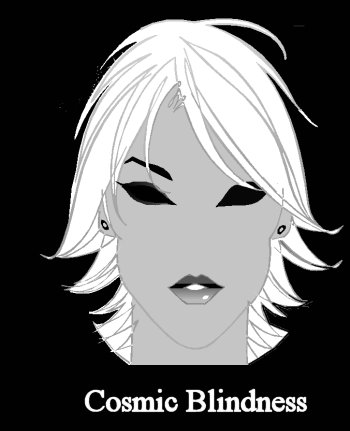 |
RICK ARCHER'S LIST OF
SUSPECTED SUPERNATURAL EVENTS
|
| |
|
A SIMPLE ACT OF KINDNESS: THE CHILDHOOD YEARS |
|
|
|
001 |
Suspicious |
Unlucky Break
Cosmic Blindness |
1955 |
| |
Rick cuts his
eye out by foolishly pulling knife in wrong direction when his mother
calls out at the worst possible time. By coincidence, Rick's father lost one of his eyes at
the same age.
|
|
|
|
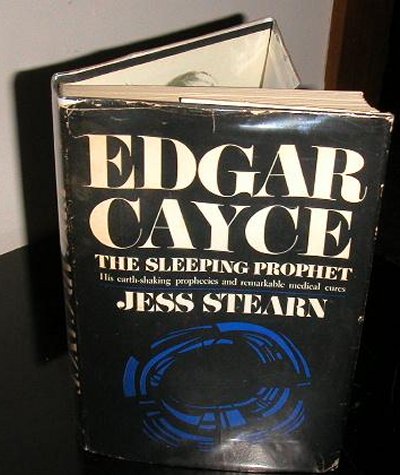 |
Jim Archer, my father, was very interested
in Fate. However I am not sure where
he got his outlook. I was probably too
young for him to talk
about his philosophies. Dad was religious. He and Mom
were members of the Quaker Meeting here in
Houston. Dad was fascinated by Edgar Cayce, the man known as the Sleeping Prophet.
He also had an affinity for a 50's TV show called One Step Beyond,
advertised as a guide to the supernatural. The show
presented tales of paranormal events and various
situations that defied logical explanation. In particular, Dad
fixated on stories about Peter Hurkos, a Dutchman considered by
experts to be the world's foremost psychic.
Dad could not stop talking about him
afterwards. "I think there
really is something to this ESP business!"
Oddly enough,
just like me, my
father lost his left eye as a young boy.
A brick falling
from a stone wall struck him as he walked home from school.
Dad heard a commotion above and looked up at the worst
possible time to allow the brick to take his eye out.
So when I cut my eye, Dad freaked out. This was too
big a coincidence for him to overlook. He was
convinced something very weird was going on and told me so.
My
father was extremely superstitious. So am I for that
matter. I get my big mouth from my mother and my
superstitious side from my father. Dad was very upset
because it seemed weird that we would both lose an eye
during childhood. However, if you thought he was
superstitious about that, you should have seen him the day
we barely escaped death.
I
had cut my eye out just days
before the family's big 1955 move to Texas. Dad
was an electrical engineer. He had recently been
transferred to Houston from Bethesda, Maryland, by his
company Square D. Mom and I stayed behind in the
hospital while Dad went ahead. When we reached
Houston, I underwent my second unsuccessful operation to remove
the cataract. It failed due to a detached retina.
However the doctor said I still had a chance to save the eye.
He recommended I stay bed-ridden for a month to see if the
retina would heal on its own.
|
Since I was healthy otherwise, I despised
being forced to stay in bed 24/7 with a
giant bandage over my bad eye.
During
my bed stay, my father would visit me every
night and sit on the bed.
As a little boy, I worshipped the ground my father walked
on. Every now and then I would ask him to show me his
Purple Heart medal from World War II. Invariably I would
also ask to see the impressive scar on his upper thigh
caused by
the bullet wound.
"Dad, was getting shot the worst thing to ever happen to
you?"
My father would nod and remind me how he had been in extreme
pain during his six month stay in the hospital.
One day after I asked him to show me his scar again, Dad
stared at the bandage covering my damaged left eye.
Sitting at the side of my bed, he said,
"You know, Rick, I am really sorry that you cut your eye.
But being blind in one eye is not the end of the world.
I'm blind in my left eye too and things have worked out okay."
I
protested. "But, Dad, I've had two operations and they haven't
done any good. Plus I've been forced to lie in bed for the
past month
because the doctor says that's the only way for my detached
retina to heal. I'm sick
of it! I just want to go running in the fields with my dog and
play baseball and stuff like that."
|
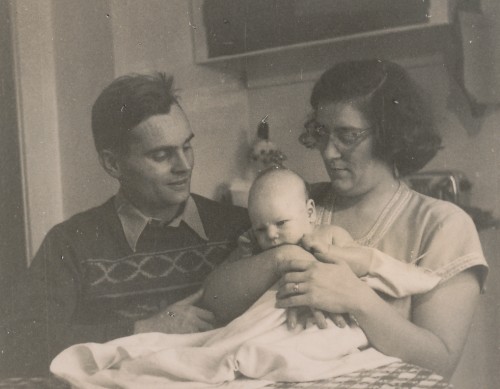 |
My father
nodded. "Yes, I understand your problem. I remember
being bed-ridden after I was wounded. But sometimes bad luck
turns into good luck. Who knows what the future holds?"
My eyes
furrowed. "What on earth are you talking about?"
For the first
time my father told me the full
story of his scar.
It was January 1945.
The Battle of the Bulge was the last major German offensive of World War II. It was launched through the densely-forested Ardennes region in eastern Belgium.
The surprise attack
in the dead of winter caught the Allied forces completely
off guard. Furthermore, it was the Americans who bore the brunt of the attack.
With their defenses down, the Americans
incurred their highest casualty rate of the war.
My father's unit of
fresh recruits had just arrived to reinforce the beleaguered
Allied forces. My father, 19 at the time, had only been in Belgium for a couple
weeks when he was told to join a scout patrol sent through the deep snow
of the Ardennes forest.
At this point, the Battle of the Bulge had not yet begun.
However, everyone knew the Germans were up to something.
|
 |
As my father's unit slowly made its way through
thick snow in this winter wonderland, a shot
rang out from a thicket of trees.
The bullet hit my father in his right hip
right where it connects to the leg. It damaged
both his thigh bone and his hip bone badly.
Instantly my
father was knocked off his feet. He fell to the ground
writhing in pain. Unable to walk, he summoned every
ounce of will to crawl towards a nearby fallen log for protection.
It was a good thing Dad moved because
another shot whizzed right past his ear.
The sniper was trying to finish the job.
The sniper did
not get another shot off because my father's comrades
instantly retaliated. They inundated the spot where the shot had
come from with a hail of bullets. Expecting to find a
body, they carefully
explored the area to find the sniper. All they found
were footprints in the snow and two empty shells behind a tree.
They could have followed his tracks in the snow.
However, well aware that the German could be planning another ambush, they
wisely gave
up the hunt.
Meanwhile Dad was
screaming due to the overwhelming pain. He
couldn't walk, so the men had to carry him back to camp. It took everything my father had in him to bear
the pain. Seeing his agony, the men in the unit expressed their encouragement
and told Dad to hang on. At that point, it was his
good fortune to pass out.
|
After being
shipped to a
hospital in England, Dad was in tremendous pain for days on end.
Even when the pain finally subsided, Dad was unable to get
out of bed without a wheel chair for several months.
Unable to walk and forced to remain bed-ridden most of the
time, he wallowed
in self-pity and bitterness at his bad luck.
Dad
said he suffered the worst depression of his life. He
was afraid he would never walk again and the constant pain
drove him crazy. Even after his discharge, Dad
walked using a crutch for nearly a year.
"That's
terrible, Dad! That must have been the worst thing to
ever happen to you."
Dad stopped his narrative and got one
of those strange looks on his face. After a pause, he
resumed.
"Yes, it was terrible. But here's the funny thing about it. Without
hesitation,
I can say this injury was
the luckiest break of my life. One week after getting
shot, I was lying there in my bed feeling sorry for myself.
That's when I heard a report that my unit's
position was under attack.
Soon the information came that half my unit was dead and almost everyone else
was
badly injured. I was so stunned I did not know what to
think.
My next stop
would be a college education care of Uncle Sam, but my
buddies weren't quite so fortunate. Their next stop
was a snow-covered grave in the Ardennes forest. My
injury got me
out of the war with
my life, my body, and my pride intact. That is how I
learned that no event
can be judged as good or bad on the spot. Time must
pass before we can render final judgment."
|
summertime 1955
a brush with death
|
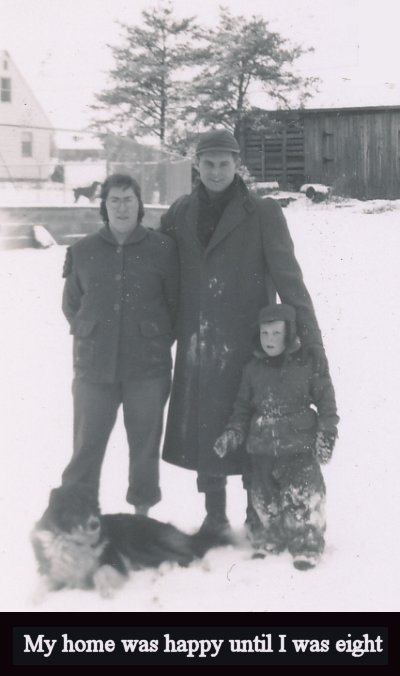 |
My father was
crazy about me back in those days. We did everything
together. Wherever Dad went, I went too. It made
Dad sick to think about what I was going through. At
the time, I was allowed to walk around with a giant patch
over my bad eye. My father already knew I was going to
have my damaged eye removed, but so far he did not have the
heart to tell me. Dad felt really sorry for me, so one
summer night he tried to cheer me up by taking me to a
carnival. Afterwards, the plan called for us to
attend a stock car competition held on a race track located
at the back of the carnival.
Dad and I had a
deal. I could play all the games I wanted as long as I
promised not to protest when it was time to go see the race. Dad let me play games,
the usual stuff, ring toss, baseball
toss, haunted house, house of mirrors, etc. However, after an
hour, Dad became impatient when he heard the sound of the
race cars
warming up in the distance. Dad said it was time to
go see
the stock car show. I could have cared less about the cars, but that was what
Dad was interested in
so I cooperated as I said I would.
As
we began making our way to the race track, the loud
roar of the powerful car engines was intimidating. Due to a
tall wooden fence, I could hear the cars, but I could not
see them. I asked Dad why the noise was so loud.
Dad said the drivers
were warming up their cars by barreling around the track at
breakneck speed. Then he added there must be a curve
just on the other side of the fence.
As we walked along the
sidewalk to the ticket booth, we passed an arcade game where I could
shoot slow-moving wooden ducks with a cork rifle. I froze in
my tracks with excitement. Overcome by a sudden irresistible urge to play,
I grabbed my father's arm and forced him to stop him too. I pleaded
with Dad to let me play one more game.
Dad said, "No,
son, you've
had enough. We're going
to be late
as it is."
But I wouldn't take no for
answer. I held onto his arm and
insisted.
"C'mon, Dad. Just this
one last game, please??"
|
Just as the word
'please' left my mouth, we were startled by the frightening
sound of a loud crash. We had been standing there debating for
no more than three or four seconds when a race driver
lost control of his car on that curve. His car plunged through the flimsy wooden fence
as if it were made out of thin paper. Whirling our heads in panic,
we screamed at the sight of an enormous race car hurtling straight at us.
Something had caused the
car to leave the ground, so it was literally flying in air.
Since the rickety old fence did nothing to slow this giant projectile, there was no time
for us to dodge. We were sitting ducks! Fortunately, the car missed us by
about three feet. The displaced air was so powerful it knocked us down with a rush. As I
fell to the
ground, I looked up to see the car
crash violently into a telephone pole ten feet to my right. The impact was
brutal; the driver was killed
instantly. He had paid the ultimate price for losing control of his
car.
As I scrambled to my feet, I heard a snapping sound.
Dad and I stared in horror as the telephone pole
broke in two, then fell on top of the crumpled car. Dad was in shock.
I guess I was too. Unable to get over seeing that poor lifeless driver
slumped over the wheel of the car, I started to cry.
Meanwhile Dad stared at me with
the weirdest look on his face.
"Son, if
you hadn't stopped me, we would both be dead now.
You should thank your guardian angel for saving us."
The timing of my sudden
interest in that arcade game was a Coincidence of the highest
magnitude. It saved my life. Otherwise we would have
been right in the path of that car. Due to his belief in ESP,
Dad believed my guardian
angel had telepathically persuaded me to stop where I was.
That confused me. Angel? What angel?
I took Dad literally and looked around. There wasn't any angel
I could see. However, my father was right
about one thing.
We had missed death by an instant. Had we continued walking,
we would have been right in the path of that speeding car.
Dad was so convinced a
Higher Power had intervened to save us, I became very interested in
my guardian angel. If I had a angel, then why didn't that driver have an angel?
Furthermore, where was my guardian angel when I cut my eye
out five months ago? Although I was too
young to fully understand the metaphysical implications, thanks to
my father, I
became interested in the Hidden World at an early age. Dad talked about Fate on several
occasions and always reminded me of the race car story. Dad was
convinced we had been saved that day because it was not our time to
die.
|
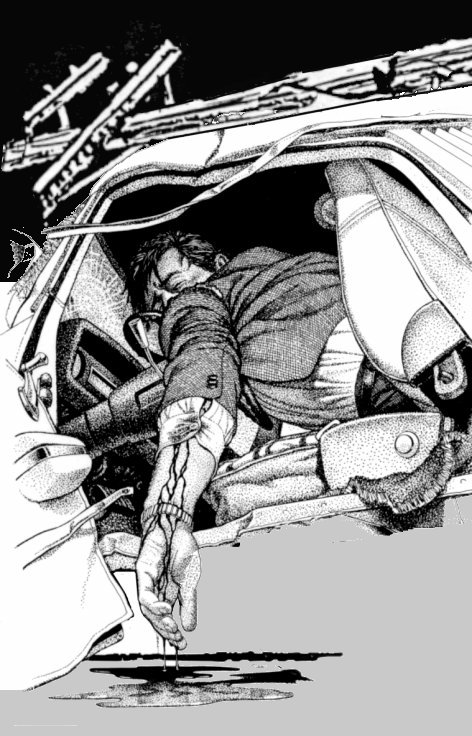 |
RICK ARCHER'S LIST OF
SUSPECTED SUPERNATURAL EVENTS
|
| |
|
A SIMPLE ACT OF KINDNESS: THE CHILDHOOD YEARS |
|
|
|
002 |
Serious |
Lucky Break
Coincidence |
1955 |
| |
A sudden impulse to play arcade game saves Rick and his
father from instant death at the Stock Car accident |
|
|
001 |
Suspicious |
Unlucky Break
Cosmic Blindness |
1955 |
| |
Rick, 5 years
old, cuts his
eye out by foolishly pulling a knife in the wrong direction when his mother
calls out at the worst possible time. By coincidence, Rick's father lost one of his eyes at
the same age.
|
|
|
|
|

A SIMPLE ACT OF
KINDNESS
CHAPTER THREE:
MOM AND DAD
Written by Rick
Archer
|
|
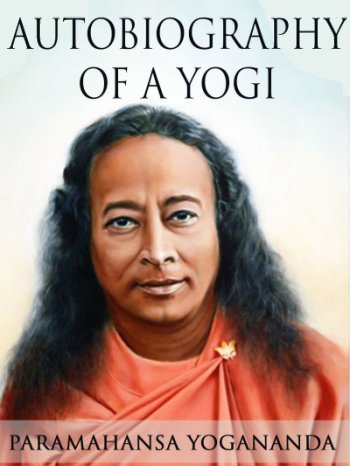 |
Rick Archer's Note:
I have a
favorite book,
Autobiography of a Yogi. Written by
Paramahansa Yogananda, the Hidden World is explained
from the eyes of a man who has the ability to see
behind the curtain. I have no way to prove
that Yogananda's claims are true, but I will say
that his book describes a Universal law known as
Karma in a very compelling way. Yogananda
explained that certain deeds we committed in one
lifetime are responsible for similar deeds done to
us in our current lifetime. However, since we
cannot see our previous lives, the world seems very
unfair because the good die young and evil people
get away with murder. We think we suffer
needlessly when in reality we are paying a price for
misdeeds in a previous lifetime.
Yogananda said that if we could see the big picture,
we would realize there is justice in the Universe
after all. In addition, he said the
distinction between a lucky break and a bad break can be easily
blurred. Sometimes good breaks become bad breaks.
Sometimes bad breaks become good breaks.
Everything that seems to be
bad on the surface may
turn out to be
something good in
disguise. Maybe there's a silver lining
somewhere. And something that seems good
on the surface may have unexpected
consequences.
Only time
will tell.
When I
read this, I could not help but think of my father's
sniper wound. To me, Yogananda's meditation on
Good Luck/Bad Luck is Kierkegaard's phrase said a
different way. We must live our lives forward,
but we will never understand each event fully until
we can look back.
|
|
"But,
Rick, you have to tell them
about your childhood. Otherwise no one will
ever understand just how screwed up you were when
you started your dance career."
-- Marla
Archer, 2013
Be forewarned I intend
to speak of my parents in a distinctly candid way. I apologize
in advance for my candor, but my story will
not make much sense otherwise. Out of respect for my
parents, I
waited till they passed on before
writing this memoir. However, once they died, I saw no reason to disguise or
sugarcoat the truth. Although my
parents deserve credit for helping me obtain a fine education and for giving me
a home, beyond that they came up woefully short. While I
understand that parents worse than mine can
be found in the filth of Mumbai and the mean
streets of Detroit, by any standard of
middle-class parenting, my parents belonged
at the back of the line.
|
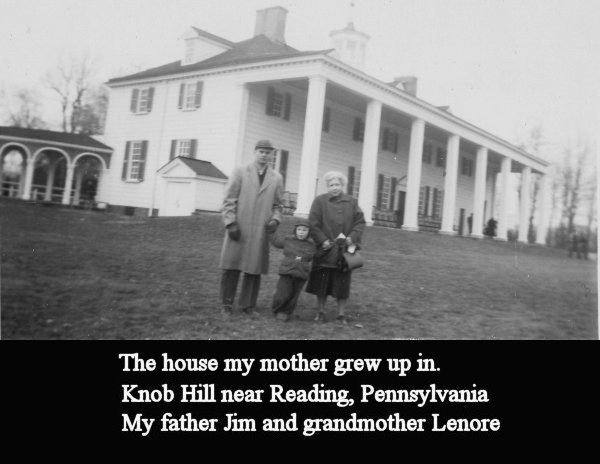 |
My mother was Mary Griffiths. She was
born on August 1925, in a rural area near
Reading, Pennsylvania. Mary's parents
were William and Lenore Griffiths.
Mary grew up in an upper class family who
lived in a comfortable and quite spacious
mansion high atop Knob Hill. My mother
described her home as very beautiful.
High upon a large hill in a heavily-wooded
area, her home offered a wonderful view that
stretched for miles. Sledding down
that snowy hill in wintertime was an
activity that brought kids from miles
around.
Mary had a step-sister Gwen who was eight
years older. Mary also had two younger
brothers Bill and Richard. As one might
gather, I was named for my Uncle Richard.
I was called Dick for the first 16 years,
then changed it to Rick in high school.
My grandmother Lenore was said to be a
beautiful woman. Her marriage to
William Griffiths, Mary's father, was her
second. Previously Lenore had married
a handsome British man named Rupert Spencer
who unfortunately died fighting in World War
I. During their brief marriage, Lenore
gave birth to her very attractive daughter
Gwen.
In case you are curious, yes, Rupert was
from the same family tree as Princess Diana.
Considering Aunt Gwen and her daughter Sally
(my cousin), were very good-looking, I
imagine they inherited the beauty the
Spencer family is known for.
|
Mary's father William was a highly-regarded
district supervisor for Standard Oil, the
Pennsylvania oil company. From what I
gather, Bill Griffiths was competent and
quite prosperous.
Unfortunately my grandfather was diabetic,
so he died when I was five. My
grandfather was a warm man, always very kind
to me in the brief time I knew him.
My mother did not like her mother Lenore
very much, but she adored her father.
They were very close. Bill Griffiths
encouraged Mary to study hard and to speak
her mind, bold advice considering this was
an age when women were fighting to be
considered equals. Only recently had
women finally won the right to vote,
unfathomable as that sounds.
I think it is interesting that my mother
kept a picture of my distinguished
grandfather on the mantelpiece wherever we
lived, but not a single picture of her
mother. Pictures tell a story, but so
do the absence of pictures.
|
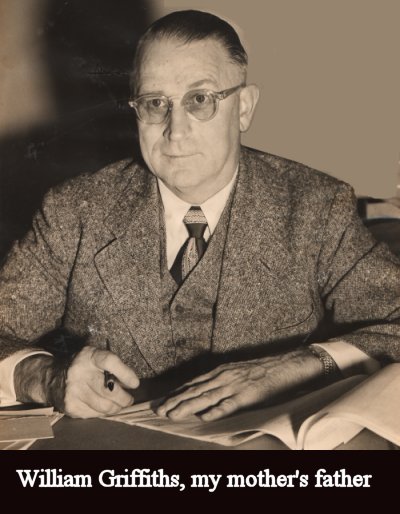 |
|
|
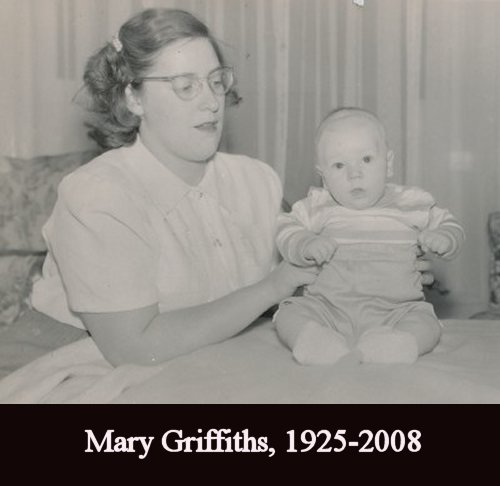 |
There were two boys and
two girls in the family. The birth order was Gwen, the
half-sister eight years older than Mary, then Bill and Dick.
Mom was extremely close to her
younger brother Dick, but always felt inferior to her older
sister Gwen who was quite beautiful. By contrast, Mary
was plump, plain and wore thick glasses.
Unfortunately Mary's
mother Lenore never failed to point out the disparity. Lenore constantly berated her
daughter about her looks. She asked why Mary couldn't try
harder to be pretty like her older sister. Do your hair, use
some make-up, but for heaven's sake, do something! And while
you're at it, lose some weight.
As one might guess, Mary
grew up feeling like the ugly duckling. Mary wasn't particularly
athletic or social. On the other hand, she was extremely bright
and excelled in school. Books were Mom's best friend.
|
| |
So what about Dad?
Like me, Jim Archer was an
only child. He was born in October 1925 in Lima, Ohio. Following the death of his
father at age 6, his childhood was very
lonely. He and his mother moved to
Reading, Pennsylvania, when he was 13. He met my mother in
high school, but they did not date. They reconnected after the
war in 1945. Mom was rich, Dad was poor. Mom was plain,
Dad was handsome.
The parallels between my
father's childhood and my own are disturbingly similar.
Dad was
an only child who did not get along with his strange mother.
Interesting.
Like me,
my father lost an eye due to a childhood accident.
Like me, Dad had a
serious bout with acne, although not nearly as bad as my problem.
Jim's father died from
acute appendicitis. While my
father didn't exactly die on me, he more or less removed himself
from my life at age ten. Following my parents' 1959 divorce, I
would see Dad for lunch four times a year and that was the sum total
of our interaction. The nicest thing I can
say is that Dad was a very smart guy and brilliant in
his field. Unfortunately, he was also a superficial man who
lacked character. He was soft. I think the world knocked
him down at an early age and he never completely got back up.
For the rest of his life, he always took the easiest way out of any
dilemma. Dad spent most of his life hiding behind the skirts
of domineering women.
Jim became a
lonely, insecure young man who turned to books as his escape route.
Hmm, so did I. Jim told me how much he missed having a father.
How ironic. I often wondered if Dad ever realized he was making me
suffer the exact same fate he did.
My father caught a lucky
break in World War II. Practically on his first day of action,
a German sniper popped him in the hip while he was on patrol during
the Battle of the Bulge. Although Dad was unable to walk for a
while, it was a non-threatening wound that left an impressive scar.
By the time the wound healed, the war was over. Dad collected
his purple heart and began his free ride to college paid for by
Uncle Sam.
|
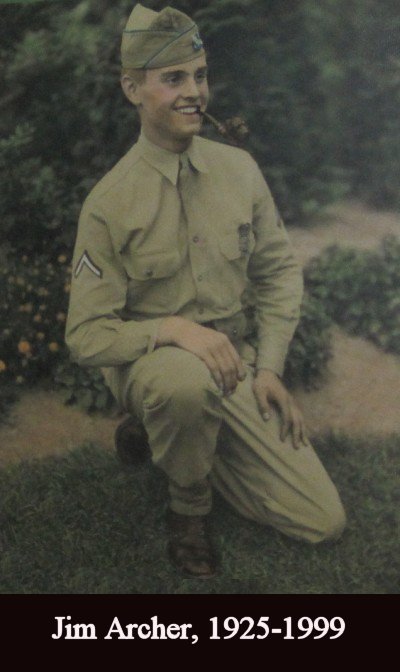 |
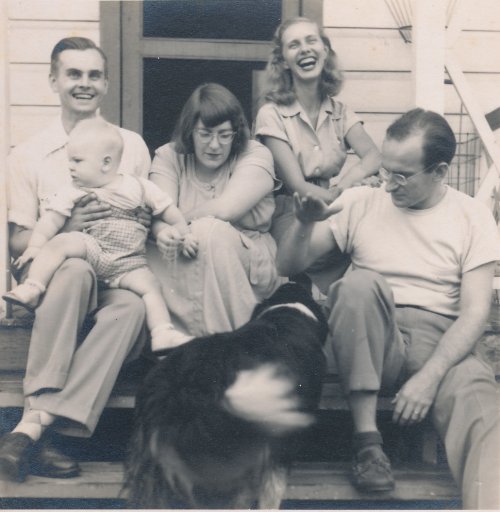 |
However, Uncle Sam
didn't pay for room and board and Jim was penniless. One might
suppose Jim could work odd jobs to pay his way, but he had a better
idea. My mother came from a wealthy family in my father's hometown. Although
Mom was plain and lacked confidence,
Dad needed a meal ticket and Mom was a
good catch. She dropped out of college to support him while he
got his engineering degree at Drexel Tech.
My father had a rather checkered genealogy.
His
paternal ancestors
from England arrived in
Connecticut in the 1600s.
His maternal Irish line
settled in Ohio and
Michigan. Sometime prior to 1900
Clara Randle from the English line married
William Peet from the Irish line and gave
birth to a son. Peet was a lout, so Clara
Randle escaped with the boy. Soon after
that Clara took up with a guy named George
Archer. There is no record of a marriage,
but the woman adopted his last name
nevertheless. At that point she changed her
son's name from Peet to Archer.
This proved to be a waste of time
because George promptly deserted Clara,
leaving
my father's father with no legal
reason to be called
'Archer'. So
what? People
often changed their names
back in those days.
However, since I do not
belong to the Archer family tree, I have no
need to buy the family crest.
My paternal grandfather had the curious name
of Orlo. He was
a traveling
insurance salesman. Somewhere
around 1924, Orlo
married Dorothy Johnson who gave birth to a
boy, Orlo Junior (Dad). Sad to say, Orlo the
First died when my
father was 6, leaving his
widow Dorothy and
her little boy to face a hardscrabble
existence. I don't
think Dorothy remarried, so it was
just her and Orlo the Second.
Incidentally, the
crazy thing is I had no idea my
father was a 'Junior' until I was in
my 70s. Nevertheless I suppose I should be
grateful things worked out like they did.
Thank you, Mom, for
saying no to 'Orlo'. I
would much rather be an 'Archer' than
a 'Peet' and thank God I didn't end
up as Orlo the Third. Just the thought
makes me shudder.
|
|
|
I don't recall much
about my father's mother Dorothy, but my mother had few good words
to say about her weird mother-in-law. Dad's domineering mother
was said to have a bad habit of relating to her son Jim more as her "companion" than son.
Which is another way of saying this lonely woman liked to touch him. I have no idea how far this went
nor do I want to know, but no doubt
this strange relationship contributed to my father's suspect character issues.
Mary probably suspected
Jim had his shortcomings. On
the other hand, he was a good-looking man and extremely bright.
Plus I can't imagine my mother had a wide range of marriage offers,
so
I expect she decided to take her chances. And so Momma's
Boy married the Black Sheep of the Griffiths family. Considering the baggage each
brought to the marriage from their respective childhoods, it was an
inauspicious match that bode poorly for the future. Their
wedding picture alone sends chills up my spine given the unfortunate
disparity in their looks.
Dad received his training as an
electrical engineer from Drexel Tech in Philadelphia. Mom
dropped out of college to support him. This was a noble
gesture at the time, but it would prove to be a serious mistake
after the divorce twelve
years down the road.
Dad
started his career a year before I was born in 1949. My first home was in
Rockville, Maryland. Dad worked as a salesman for Square D,
a manufacturer of fuse boxes and equipment used to control and
distribute electric power. The company transferred Dad to Houston when I was six. Dad was good at
sales, but yearned to put his engineering talent to better use. While
I was in college, Dad moved over to Kranco, a company that built massive
cranes. During his career at
Kranco, Dad was finally able to show the world what he could do.
My father was frequently called in to handle the toughest
assignments. Due to his creativity, Dad became
the go-to guy for large and difficult projects that called for unusual solutions.
For example, he designed the
electrical system for a rocket-launching crane at Cape Kennedy
meant to hurl astronauts into space. Another time he designed
the electrical system for a crane used to remove spent tie rods
from
a nuclear reactor.
|
 |
My father's forte was succeeding at jobs where
others failed. He designed the electrical system for a crane
forced to work in sub-zero temperatures at a lumber mill in far
northern Canada. The Canada project is where he showed his
special talent. Several engineers had worked on this
assignment previously, but could not overcome the problem of the
extreme freezing temperatures. However this was not a problem
for Dad. Once Jim was
able to get that lumber mill equipment to work despite the arctic
cold, he received several impressive
new projects and watched his salary rise in proportion.
And so did my father's
fame. He was considered a genius in his field.
|
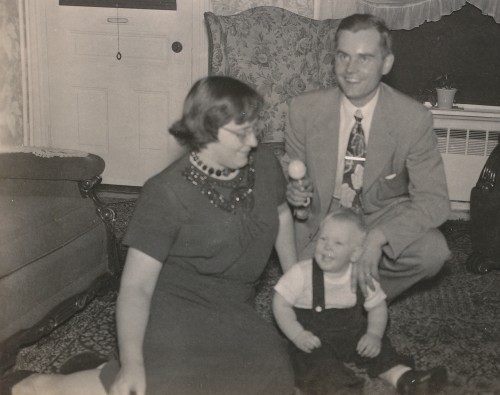 |
Dad's most interesting project was
designing a crane to handle a
secret prototype aircraft
for the military. Asked to work strictly from
specifications, Dad was never allowed to see the actual plane itself
in New Mexico. Dad loved to talk about
that project.
Due to his superstitious streak, he was more than willing to
believe in UFOs, especially since the dimensions he worked with did
not exist for any known aircraft. Consumed with curiosity, Dad was positive his
crane was being used either for a plane with stealth technology or
some sort of alien space ship. Considering the proximity
of the airbase to Roswell, his UFO theory seemed plausible.
The Civil War was my
father's favorite preoccupation, especially Gettysburg. He was
convinced the South should have won the war. Why did Jeb
Stuart, the main scout, disappear when Lee needed him most?
Why did Stonewall Jackson have to die of an injury little more
serious than a flesh wound?
My father was also very interested
in the occult. For Christmas one year,
Dad gave me a book on Edgar Cayce, the sleeping
prophet of Virginia Beach. Dad would explain to me how Cayce would go into trances and
magically come up with amazing cures for extremely sick people that
doctors had given up on. Cayce also
raised the prospect of Reincarnation as a fact of life, not just
some mumbo-jumbo Hindu philosophy. Dad used to say Edgar
Cayce interested him more than any other person on earth.
Following some
strange college experiences, I would one day come to agree with him.
|
My first eight years
were idyllic. Not only did I love my father with all my heart, Dad was very fond of
me. Aunt Lynn
once told me that back when I was a little
boy, my father used to watch me with a look of pride that touched
her deeply. Lynn said, "Your father absolutely adored you."
I agreed with Aunt Lynn. That was my
impression
too.
I think Dad liked me
a lot, or at least he did in the beginning. As for me, I worshipped the guy
when I was little. I tagged along
wherever he went. Whenever my father built something in garage,
I would sit there and watch him all day long.
I
remember watching in awe as Dad built an ultra-complicated electric train network
in the attic. Dad
covered a giant table with interlocking train tracks, then
added mountains,
tunnels, and bridges. Using split levels, one train would pass
on a bridge over the other. I always expected those
two trains would crash sooner or later, but they never did. This amazing complex was
so huge it took up
half the
attic. I was absolutely mesmerized as the two trains crisscrossed
the complicated tableau without crashing or running off the rail. I beamed with pride. I had the
smartest Dad in the world!
|
 |
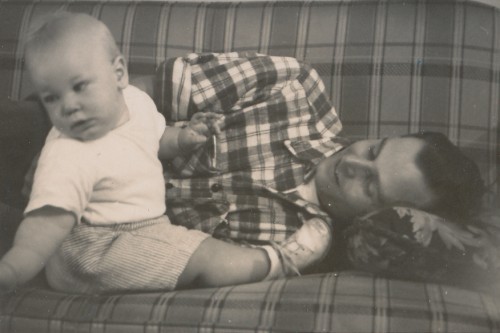 |
Jim was not an
aggressive man by nature. Rather than use his fists, he
was more the passive-aggressive type who got even in sneaky
ways. I suppose my mother was the same way, but let's
stick to one parent
at a time.
When I was 8, we moved to Sharpstown, a brand new
subdivision at the far
western edge of Houston. We lived next to a neighbor whose
house was on the corner. He was a grouchy old guy who
lived and died for his beautiful St. Augustine grass.
Every time I walked past his house, he was working on his lawn.
I had just gotten my new puppy Terry. One day as Terry and
I came home from a nearby field, the old man screamed at me for
walking through his yard. My mistake was using a well-worn
shortcut that crossed diagonally across his lawn instead of
using the sidewalk rectangle around the corner. It wasn't
all my fault. Every kid in the neighborhood did the same
thing. Except that I got blamed for the problem. As
I cringed in fear, the man pointed to the barren path where his
precious lawn had been damaged, then really laid into me.
"From now on, kid,
use the goddamn sidewalk! And while you're at it, I want you to
keep your damn dog from doing his business on my lawn!"
|
When I
told my father what happened, he was furious. Rather than
speak to the guy and maybe clear things up, Dad thought
of a very
unusual way to get even. He drove to the
hardware store and brought back three sacks of fertilizer.
That night after I went to bed, I heard Dad working in the garage. So I went and peeked through the
door. Dad got out that fertilizer and hand-sprinkled huge
quantities into the man's yard in the middle
of the night. However, that was not
good enough. Dad was afraid of getting
caught so he put his genius to good use.
First Dad bought some sort of
contraption, then used his engineer skills
to modify it into a make-shift catapult
strong enough to reach the far corners of
this guy's lawn. Trust me, it was
quite a sight to see Dad launch giant clumps
of fertilizer into our neighbor's lawn at 5
am. This way he could fertilize the
entire lawn undetected.
|
|
|
|
Sure enough, the
neighbor's grass began to grow like crazy. However Dad refused to stop,
so once a week he got out his catapult. For the entire
summer, that poor man was forced to mow his
lawn practically every day in the hot sun. Sitting in his
shaded lawn chair with a drink, Dad loved to watch the guy mow. Dad thought it
was the funniest thing he had ever done.
Dad and I had a
grand adventure when I was 8. We embarked on a
cross-country summer camping trip that took us all the way to
the Grand Canyon. One night in a remote and completely deserted park in Arizona,
we were awakened by two bears who got into the trash can outside the
tent. Uh oh. Dad had left some food out. Unfortunately, we
were the only ones at the campground. There was no one
to save us if the bears came after us.
Boy, was I
scared, especially when the bears growled! As we cowered in our
tent, Dad pulled out his prized Bowie
knife. Dad told me not to worry; he was ready to defend me. I
wasn't so sure that big knife was going to be enough. Fortunately the bears never bothered us as we remained huddled
and quivering in our tent. We eventually made a run for our car and
drove to a motel. When we returned the next morning
to pick up our gear, there were bear tracks all around our tent. We were
both pretty shaken by he ordeal. Not surprisingly,
Dad was done with camping. We
stayed in motels for the rest of the trip. Oh, so what?
Bears or no bears, that was a great trip! Dad and I had a
wonderful time together.
Sad to say, that
1958 trip was our final moment of happiness together.
We were so tight that his
later abandonment made it that much harder to understand. How does a father go
from idolizing his son to forgetting his son? Why
would a man go from caring to not caring?
|
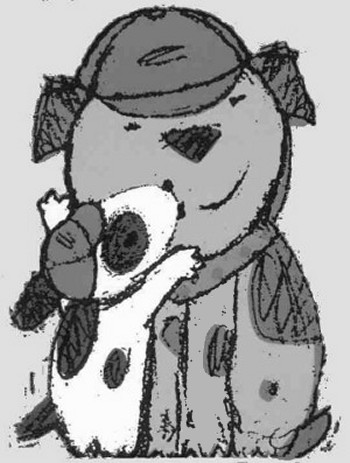 |
1958-1959
THE STORM
BEGINS
|
Not long after we
returned home from Arizona, serious marital problems developed.
My parents began arguing every single night of the week.
I am an only child.
As many an only child can attest, 'only' and 'lonely' rhyme for a
reason.
Age 8, I was terrified when my parents began fighting practically
any time they looked at each other. Their raised voices during the
nightly arguments reverberated throughout the house.
Frightened, I would run to my room.
However no walls could contain
the sounds of their anger and loud voices. Consequently I spent many a night
crying myself to sleep. Trembling and alone, I learned to depend on my year-old border collie
Terry for security.
I had no idea why my
father had become such an angry man. He
had gained weight and grown distant. When he wasn't
arguing with my mother, he spent his nights locked in his study
reading or solving math problems. Personally, I wish he
had stayed in his study. When he did decide to come out, Dad
turned into something straight out of the Shining.
Here's Jimmy!!
My memory is that Dad
started the fights. He liked to pick on my mother. Dad
would to
come home and inspect the house. He found fault at the drop of
a hat. Seriously, Dad would walk in
the door, put his briefcase down, hang up his hat and immediately
stroll around the house. It was obvious he would
keep looking until he found an excuse to start an argument.
Eventually Dad would find something to
criticize my mother over. Dad's favorite trick was to run his
fingers over every surface until he found dust.
|
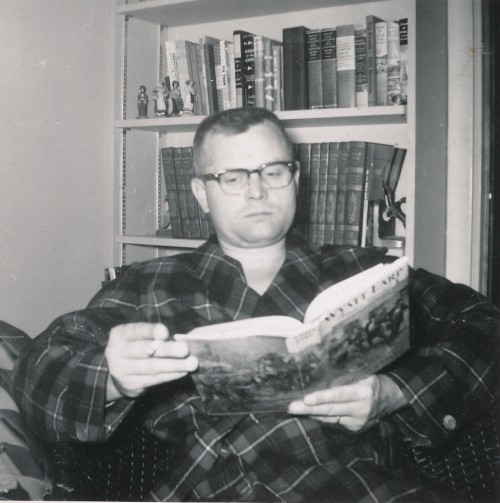 |
I knew the
script by heart. "Mary, god damn it, I work my ass
every day and all you do is sit around the house and do
nothing!"
Game on.
My mother would take offense at his effrontery and the fireworks would begin. Dad loved to tell my mother
how lazy she was. I suppose he was right. Mom was not
big on housework. Furthermore she was quite comfortable with clutter.
On the other hand, the house wasn't that bad. My father didn't see it
that way. He expected the house to look perfect.
Why the hell should he have to
work so hard only to come home to a dirty house? What
did she do all day, watch TV? Read magazines?
"Damn
it, woman, get
off your fat ass and do a little work sometime!"
|
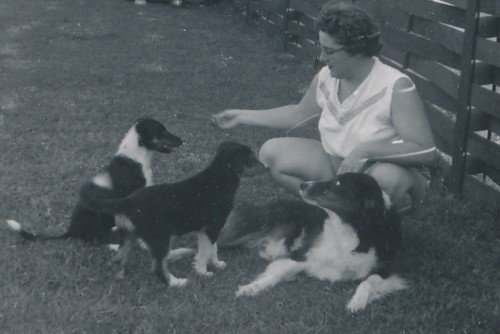
Duke was Mom's dog as
well as Terry's father.
Terry is the middle dog. Mom gave Susie away.
|
Those were fighting
words. Sure enough, a major battle quickly ensued. Things
would escalate and some really mean things would be said.
In my opinion, my father was totally off base.
Whatever he objected to was hardly worthy of a screaming
match. In addition, my father had
conveniently forgotten this was the same woman who sacrificed her own education so that he could get his.
Now that he didn't need her any more, my father began to tee
off on Mom nightly.
My parents
never even noticed me as I stood there watching them in
horror. When their voices began to rise, I soon learned to run to my room for shelter.
I had only my dog Terry for comfort. It didn't matter that
Terry was little more than a puppy; he was the only friend I had. I would
shut the door to lessen the noise and pull Terry onto the bed.
Then we would both hide under the covers. When the arguing got too intense, I would start crying in the
solitude of my room. Once I ran to my room,
the door stayed closed for the rest of the night. Neither parent ever
came to check on me after the battle was over. That was a really rough year.
I became a major disruption at school and my grades plummeted.
Now for the irony.
When my grades dropped, my father concluded I wasn't nearly as smart
as he was. That is what led to the Devil's Bargain.
|
|

A SIMPLE ACT OF
KINDNESS
CHAPTER FOUR:
THE DEVIL'S BARGAIN
Written by Rick
Archer
|
|
There was a old farmer in the remote Taihang
mountains of China
who used a horse to
till his fields.
Considering how rocky the soil was, this was an
arduous task.
One day, the horse escaped into the hills.
Now the farmer had no way to till the field. When
the farmer's neighbors sympathized with the old man
over his bad luck, the farmer
shrugged.
He replied, "Bad luck?
Good luck?
Who
can say?"
A week later, the horse
returned with a herd of wild horses from the hills.
The farmer put them all in a corral, sold some,
kept some. This time the
neighbors congratulated the farmer on his good luck.
He
replied,
"Good luck? Bad luck?
Who
can say?"
Soon after, the farmer's
only son
attempted to tame one of the wild
horses. The mustang reared up and threw the boy
off its back. The boy
hit the ground hard and broke his leg.
As the boy screamed in pain,
everyone agreed this
was very bad luck. Now
the old man had no one to help him till the fields.
The
old farmer
wasn't so sure. With his whimsical smile,
as usual his only reaction was, "Bad luck?
Good
luck? Who can say?
|
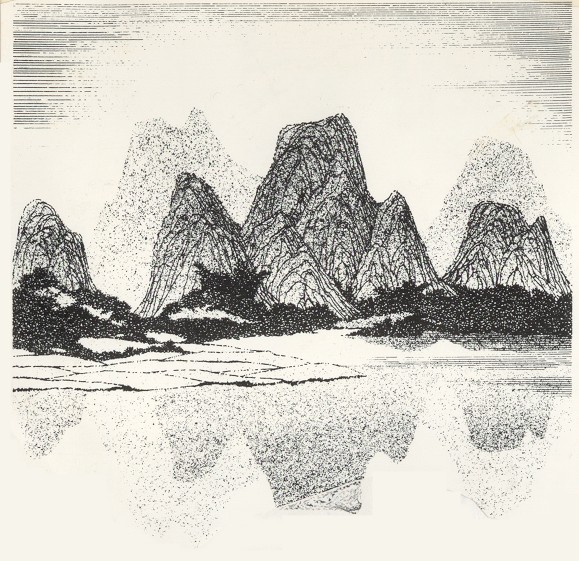 |
Some weeks later,
there was a dangerous Mongol invasion. The
local militia marched into the village and conscripted
every able-bodied youth they could find. When they saw the farmer's son
was unable to walk on his
badly broken leg, they didn't
give him a second glance. Who needs a
cripple? In
the Chinese army, everyone had to march, so the
boy was left behind.
Good luck or bad
luck? Who can say?
|
|
September 1958-may 1959
problems in the 4th grade
|
In addition to
crying myself to sleep every night, I
frequently
disrupted my
4th grade class.
My school grades were lackluster and my discipline marks
were abysmal. I had turned into a daily pain in the butt for my teacher. Each morning I would
take a seat in the back of the class room. I would draw
extensive tableaus of two armies complete with tanks, hand grenades and
bazookas. From there I would spend the rest of the morning blowing
up every soldier complete with boom boom boom sound effects and
excruciating death moans. For variety, I
would draw spaceships and destroy them with
ray gun zap zap sound effects. Then I switched to dinosaur
battles. I wasn't quite sure what sounds dinosaurs made, but
growls got the job done."
And how did my teacher
react? She was not happy. Looking back, I am
ashamed of myself. I must have
been a load. My poor teacher
tried to overlook my disruptions, but how could she?
I sat in the back
and tried to keep my noises muffled, but
if my
teacher could hear all the way up at the front, apparently my
muffling left a lot to be desired. She would ask me
to be quiet and I would comply, but the battle would soon resume.
My noisy pitched battles
were
just the tip of the iceberg. I already had my smart mouth.
I talked back all the time, not just to my father, but to anyone who
told me what to do. I had become a cold, surly, angry kid.
Not surprisingly, I received failing marks for
discipline.
As for my smart mouth, my mother let me get
away with it. I was more careful around my father because he
was so angry all the time. To be honest, I don't recall being corrected for sassing
my parents.
They were so preoccupied with their own problems in that final year,
they barely paid attention to me.
|
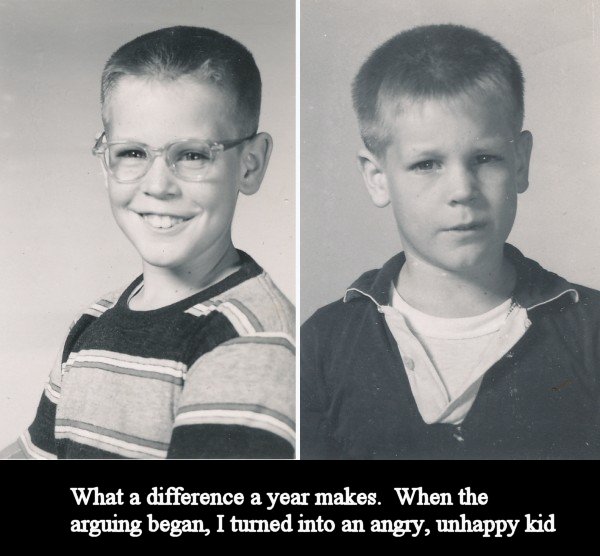 |
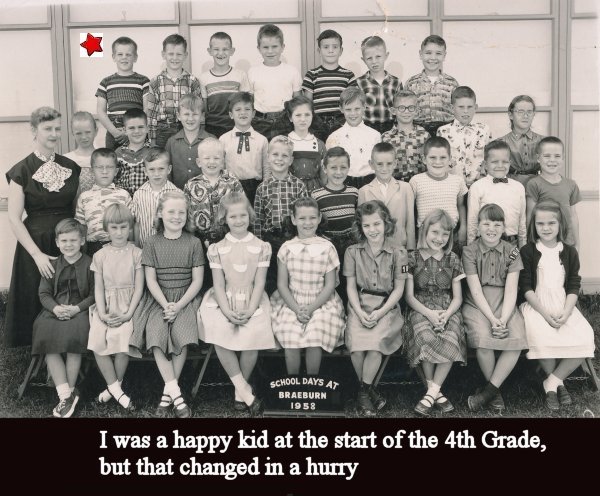 |
To be honest, neither parent was much of a
disciplinarian. Nor did they have any reason to be until the problems began.
Since I was basically a happy boy, I gave
them little trouble and did whatever they
asked to do. Growing up with a minimum of parental guidance,
I was never taught the do's
and don'ts of when to speak, what to say, what not to say, when to shut up.
However, as the tension at home built, I
became increasingly defiant and rude with my
teacher Miss Davis. Understandably
this nice lady got fed up with me. One day I brought a note home from school to
be signed. The note said that I was an enormous disruption in
my class and it was time for my parents to visit the principal.
The principal made it clear to my parents that I would be suspended if
they
couldn't get me under control.
In addition to my discipline
issues, my parents were
shocked at how poor my grades were. They had always
thought I was smart, but after seeing my recent report card,
they were beginning to have their doubts. What they did not
know is I rarely paid attention in class
and only periodically did my homework.
And why didn't they know? Because their
minds were on their own problems.
My father went off the deep end. Since his own childhood
was accompanied by an unending series of superior school marks, I
imagine his pride was shaken to see his only child struggle to
muster a D average against public school competition.
|
September 1958-may 1959
dr. Mendel
|
Throughout my 4th Grade
school year my parents were busy trying to save their marriage.
They had been in therapy with Dr. Mendel, a noted psychiatrist here in
Houston. After the principal's warning, they asked Dr. Mendel to take a look at me.
Maybe the eminent doctor could explain why my grades were so poor and why I was
angry all the time. Such a mystery, right?
I'm just being
sarcastic. Yes,
my parents knew full well why I was angry.
What they didn't know was what to
do about me.
After some testing, Dr. Mendel told my parents they didn't need
to worry about my intelligence. In his opinion, I was a
smart kid. As for the anger, he said I was acting out due
to tension at home. He also suspected I was bored in school. He told my parents
what I needed was a challenge. He said my parents should put
me in
a school with a faster pace, something that would
focus my unharnessed energy.
Dr. Mendel knew exactly where I could find that challenge.
He suggested my parents put me into St. John's, a private school
where his own two boys were thriving. He had been very
pleased with the progress of his sons. Dr. Mendel was
convinced this school
for gifted children was just what I needed. Only one
problem.
My father was deeply opposed to the expensive
price tag.
He argued if his son could barely pass public
school, why pay all this money just to watch him be annihilated by
all those elite students? Public school was good enough for him and it would
be good enough for me.
However, my mother refused to drop the
subject. When Mom said the testing phase was free, Dad relented and allowed me
to take the admissions
test. To be honest, I think Dad expected I would do poorly
and that would let him off the hook. Now he wouldn't have to be
the bad guy. However, to his surprise, I did well on the test
and was given an acceptance letter.
Now my father began to
seriously object. Too expensive! Giant waste of money!
Not only that, why should he take this man's advice?
Dad hated the therapist
because in his opinion the doctor usually sided with my mother's
position.
There was no way Dad was ever going to agree to
this folly. Forget it.
|
September 1958-may 1959
the mistress
|
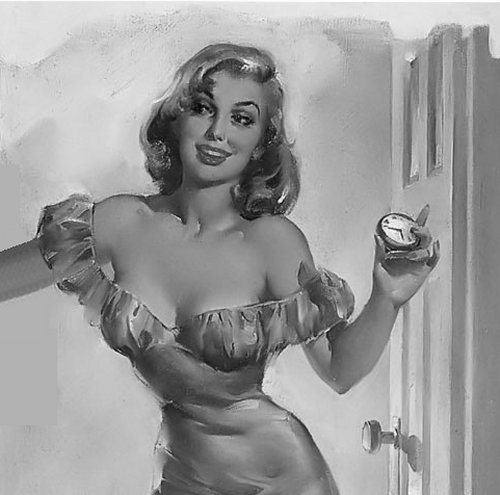 |
The major reason my parents' therapy was
going nowhere was my father's secret mistress.
Dad claimed he was trying to save his marriage,
but that was a smoke screen to give him time
to evaluate the new woman in his life.
Did I know about the mistress? No.
Did my mother know about the mistress?
No. But she had been suspicious ever
since Dad began staying late at the office
with increasing frequency. The moment
Mom noticed my father's secretary was quite
attractive, her suspicion increased.
Realizing how inflammatory it would be to
accuse Dad of having a mistress, I think Mom
bit her tongue. But I can't be sure.
It was not like my parents would confide
their marital problems to me. But they
didn't need to. All I had to do was
listen to their knock down, drag out battles
to get the latest scoop.
That is how I knew that my father was
completely opposed to sending me to St.
John's as the therapist recommended.
Then one night I heard Jezebel mentioned for
the first time. Of course that is a
pseudonym, but due to my animosity towards
the woman, just typing her real name makes
my blood boil. Suffice it to say my ears
perked up when Jezebel entered the
conversation, but to my profound irritation
they subsequently lowered their voices for a
change. Stuck in my room, I had no
idea what they were talking about.
I got my answer the next day. Mom
announced I would be going to St. John's
next year. She failed to add they had also agreed to a divorce.
My parents were such cowards they never said
a
word. Instead they packed me off to
live with Uncle Dick and Aunt Lynn for the
summer. Uncle Dick, Mom's brother,
drew the unlucky assignment of breaking the
bad news.
|
September 1958-may 1959
the devil's bargain
|
During the heat of the battle I had only the
vaguest idea what was going
on. However, through the gift of
Hindsight plus the occasional hint my mother
let slip, further down the road I was able to figure out the
score. Trying hard to keep
Jezebel a secret, my father had been asking
for a divorce for some time. My mother
said no each time. Since Dad had
control of the economic purse strings, a
divorce was not at all to Mom's advantage.
Sad to say, my stay-at-home mother had zero
job skills and no college degree.
However, Mom probably knew the divorce was
inevitable because one day she went out and
got a part-time job just in case.
Meanwhile my father was getting increasingly
frustrated. He knew a contested
divorce would be costly. And if news
about Jezebel ever got out, uh oh, say
goodbye to his savings. As a result
the divorce talks remained at an impasse
with my mother stubbornly saying no.
|
However, the
dynamics changed when I was accepted into St. John's.
Say what you will about my mother. Mom was a hopeless
mess, but she did have a good heart. Unlike my father,
she recognized Dr. Mendel's advice concerning St. John's was
correct. In addition, she knew how hard it was to gain
admission into St. John's. I think she knew my
acceptance was some sort of crazy fluke, a
once-in-a-lifetime lucky break for me that should not be
passed up.
So the next time
my father asked for a divorce, Mom countered with a deal.
Send Richard to St. John's and he could have his divorce.
Did Dad take the offer? No. Too expensive!
In my father's defense, the tuition at SJS was so steep that
his modest middle-class salary would never be enough.
More than likely, Dad would be forced to borrow money to
make ends meet.
However,
my mother insisted. When Dad balked again, Mom played her ace.
She told Dad she had a strong suspicion he was having an affair with his
secretary. When Dad denied it, Mom told him she knew full
well he was seeing another woman and had proof. Mom said she would make this divorce
very ugly unless Dad did the
right thing. Mind you, Mom didn't
have any proof. It was a total bluff. Nevertheless, the
moment Mom said she had proof, my father folded like a wet blanket.
Although he continued to deny the affair, his rapid
capitulation spoke volumes. So now you know how my mother successfully
blackmailed me into St. John's. The divorce settlement included my
father's agreement to pay full tuition at St. John's for three years...
4th, 5th, and 6th grades. After that his obligation was over.
It was a Devil's
Bargain. I gained a
school, but lost a father. I
would barely see him for the rest of my life.
Good luck or Bad
Luck? Considering what a deadbeat my father turned out
to be, I suppose I got the better end of the deal. But
I paid a terrible price. Although my
superior St. John's
education would become the shining light of my
childhood, the divorce and my father's subsequent
abandonment would damage me almost beyond
repair.
|
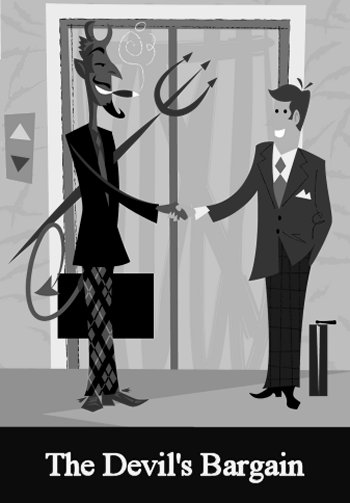 |
September 1959
is st.
john's a supernatural event?
|
As we shall
see,
St. John's School was the main
reason I survived my childhood at least
partially intact. So
I
asked myself if this gave me the right to
add SJS to my List of
Suspected Supernatural Events.
Please take note of the word 'Suspected'.
I would not dream of claiming I am right
about every event I add to my List.
The best I can do is say that some Events
are further beyond the limits of
Believability than others. If the
Event is truly unbelievable, I list it as 'Serious'.
If there are other possible explanations, I
am more inclined to list an Event as 'Suspicious'.
On the surface, the Reader might question my
decision to call St. John's a Supernatural
Event. For that reason, I would like
to explain my reasons. For starters, I
had no business being there. Given my
mediocre grades in public school, to this
day I cannot imagine how or why I was
accepted. This school was so difficult
to get into that the son of a future United
States President was denied admission.
St. John's belongs on my List for three
reasons. First of all, the Impact.
My nine years at St. John's gave me the
education necessary to succeed in life.
For example, where do you suppose I acquired
my writing skills? But it goes deeper
than that. When I speak of a Simple
Act of Kindness, time after time someone at
SJS stepped forward just in the nick of time
to keep me from falling off the path.
Second, Probability. St. John's is
extremely secretive about its admissions
process. No one knows for sure what
the 'Applicant Acceptance Ratio' is.
One in ten? One in twenty? The
key word is 'Exclusive'. In my
day, St. John's made a real effort to limit
each classroom to 15 or less students.
St. John's was so difficult to get into, the
attrition rate was very low. For
example, my original 4th Grade class had
roughly 40 students. 37 students were
promoted from the SJS 3rd Grade class while two or three
new students such as myself were added. Typically one or two students
moved to another city per year. And
rumor has it that parents of struggling
students were advised to transfer them to an
easier school for self-esteem reasons.
What I am saying is that out of perhaps 50
applicants, I was one of two or three to be
accepted. Those are pretty long odds.
Why me? To this day my admission feels
like a small miracle.
Third, Weirdness. How does one define
Weirdness? You can't measure it.
Weirdness is a totally subjective criterion.
So try this one on for size. Rick
Archer gets accepted into a school his
father cannot afford thanks to a mistress so
tempting he cannot bear to live without her.
To me, that is a weird story. "Rick
Archer owes his elite education to his
father's mistress." Should I say
thank you?
Oddly
enough, it has been known to happen.
Prince Edward, the man next in line to
become King of England, abdicated his throne
in 1936 to marry Wallis Simpson, a commoner
and two-time divorcee. At the time, it
was such a scandal that no one could believe
something this weird was even possible.
I contend my own story was almost as weird.
|
RICK ARCHER'S LIST OF
SUSPECTED SUPERNATURAL EVENTS
|
| |
|
A SIMPLE ACT OF KINDNESS: THE CHILDHOOD YEARS |
|
|
|
003 |
Suspicious |
Lucky Break
Unlucky Break |
1959 |
| |
Father's affair leads to Rick's
education at St. John's, the most important lucky break of his life.
However, as time goes by, Rick's social isolation at a rich kid's school
turns him into a moody loner.
Fortunately, due to a series of small kindnesses, Rick will manage to
graduate at least somewhat intact. |
|
|
002 |
Serious |
Lucky Break
Coincidence |
1955 |
| |
A sudden impulse to play arcade game saves Rick and his
father from instant death at the Stock Car accident |
|
|
001 |
Suspicious |
Unlucky Break
Cosmic Blindness |
1955 |
| |
Rick, 5 years
old, cuts his
eye out by foolishly pulling a knife in the wrong direction when his mother
calls out at the worst possible time. By coincidence, Rick's father lost one of his eyes at
the same age.
|
|
|
|
|
|